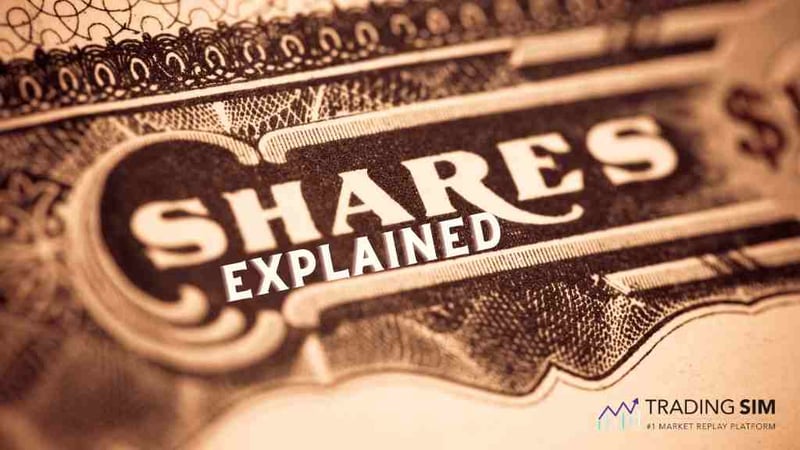Shares are units of equity stock and represent equity ownership in a company. The persons or institutions holding shares of a company are called shareholders, and their ownership stake in the company is proportional to the number of shares held by them as a percentage of the total number of shares issued.
For example, if a company has issued 50 million shares and one shareholder owns 5 million shares of those 50 million shares, the shareholder's stake in the equity ownership would be 10%. The shareholders are eligible for getting dividends as and when announced and declared by the company's board of directors.

What are shares outstanding in stocks?
Shares outstanding represent the total number of shares held by its shareholders, including institutional investors and company insiders. However, shares repurchased by the company are excluded from the total number of shares for calculating the number of shares outstanding. The number of shares outstanding can change due to a variety of reasons. For example, if a company issues new shares to raise capital, the shares outstanding would increase, whereas if it repurchases its own shares from the market, the number of shares outstanding would decrease.
The number of shares outstanding is reported on the company's balance sheet as Capital Stock.
What are common shares?
Common shares are securities that represent ownership in a company. Each common share has a voting right that allows shareholders to cast their votes for electing the company's board of directors and also vote on other important corporate matters.
While common shares represent ownership, this doesn't mean that every shareholder can lay claim to the company's assets. Actually, in the event of a company's liquidation, the claims of common shareholders are settled only after the claims of bondholders and preferred stockholders are settled.
You can find the common stock figure of a company on its balance sheet in the stockholder's equity section.
What is the difference between Class A shares and Class C shares?
Companies can classify their shares into different categories, usually based on their voting rights. When companies divide their shares into various classes, they assign different rights to shareholders based on the class of shares they hold.
Class A shares usually have more voting rights than other classes of shareholders and are typically held by the company's management to keep the entity's control in their hands. However, the company has the discretion to assign specific weightage of voting rights to any type of asset class.
This means that high voting rights are not reserved for only Class A shareholders; it depends on the company how many voting rights it assigns to each category of shareholders. Some companies, such as Google, give more rights and privileges to their Class B shareholders while others give their Class A shareholders exclusive rights.
Class C shares usually have no voting powers. Companies create this class of shares to alienate some shareholders of their voting rights, preserving the control of the company's founders and management on the company.
These shares generally trade at discount to other classes of shares with voting rights because of no voting rights associated with these shares. This makes Class C shares accessible to and affordable for a large number of investors. Some companies also offer Class C shares to their employees as part of compensation.
You need to study the issuing company's charter and bylaws or financial reports to determine the classes of shares and the rights of each class of shareholders. Classes of shares can be different for different companies, so you should find out which classes of shares are available and which are most suitable for you.
What is the difference between shares and stocks?
Shares and stocks are often used interchangeably to refer to a company's shares. However, there are some subtle differences between the two terms.
For example, a share is the smallest denomination of a company's stock, which means that stock is referred to as equity for the company issuing it. On the contrary, a share is referred to as single security constituting the company's stock. A stock refers to non-specific ownership in a company, whereas shares refer to a specific and quantifiable ownership interest in a company.
There are various instances when investors use the two terms interchangeably. For example, when investors say a common stock or preferred stock, they actually mean common shares and preferred shares.
While the distinction might not be significant, you should know that both could have different meanings in different situations.
How many shares are in a stock?
A company's stock could have millions of shares, depending on many factors. The total number of shares a company is authorized to issue as stipulated in its Articles of Incorporation or Memorandum of Association. However, most companies issue less than the authorized capital and issue additional shares as and when required. So, the maximum number of shares a company can issue is equal to its authorized capital.
What does it mean to buy one share of a stock?
Buying one share of stock means buying a single share of a company's stock. While shares are usually bought in lots or multiples of 100, some brokers allow you to buy a single share or even fractional shares as well. If you are underfunded or are buying a costly, high-priced share, you can consider buying single shares of different companies.
How many shares can I buy?
Theoretically, you can buy all the shares of a company available to the general public on the market. However, you need to have enough capital to fund such a large purchase. Some brokers give leverage to margin account holders, who can buy twice the amount they have in their accounts. However, cash account holders can only buy shares for the amount they have in their accounts. For example, if you have $10,000 cash in your brokerage account, you can only buy shares worth $10,000.
How many shares does a company have?
The number of shares a company can issue is known as authorized capital, which is mentioned in the company’s Articles of Incorporation or Memorandum of Association. You can find out the company’s issued capital to determine the number of shares issued by the company on the SEC's EDGAR database.
What are US equities?
U.S equities refer to the shares of U.S companies. Shares of the U.S publicly-listed companies are traded on the U.S stock exchanges, where investors can trade these shares. For all intents and purposes, equities and shares are interchangeable terms.
What are advisory shares?
Advisory shares are stock options of a company given to advisors as compensation for their advisory services. The advisory share stock options allow advisors to buy the common stock of the company at the grant price. Instead of cash compensation, many start-ups offer advisory shares to expert advisors as a way of compensation.
Summary
Buying shares of a company allows you to become a part of the company's growth and also become one of its owners. As a shareholder of a company, you can earn profit in two ways: dividends and capital appreciation. As a shareholder, you are eligible to get dividends if the company declares them, and you can earn a profit if the price of the share rises.
Buying shares of the right companies can be highly profitable, provided you conduct your research before investing in them.










 amazon stock
amazon stock 
